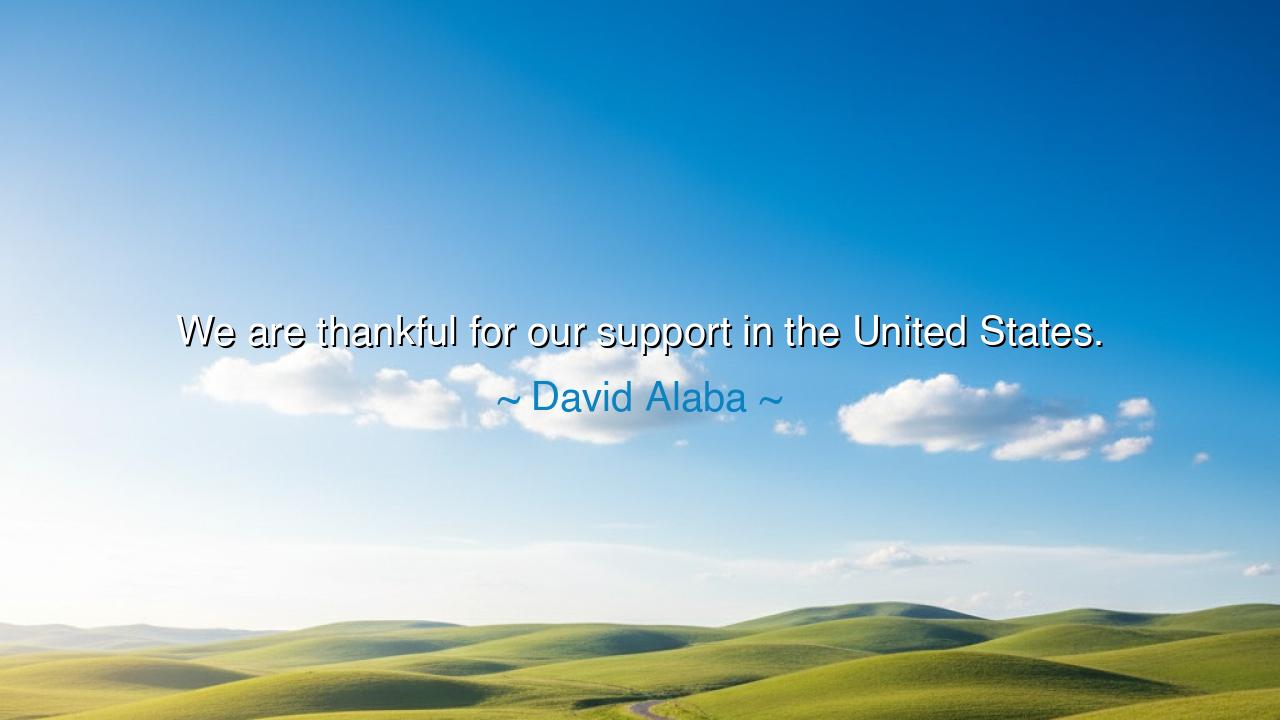
We are thankful for our support in the United States.






Hear the words of David Alaba, spoken with gratitude that crosses borders and oceans: “We are thankful for our support in the United States.” At first glance, these words seem simple, but in truth they carry the ancient weight of community, loyalty, and the power of unseen hands that lift others to greatness. For no athlete, no artist, no leader rises alone—behind every triumph there stands a multitude whose cheers, prayers, and presence shape the destiny of the few who stand in the light.
The ancients knew this truth well. The warriors of Sparta, though remembered by name, were never alone in their struggle. The women, elders, and children who remained at home sustained their courage and carried their memory. Likewise, the Olympic champions of Greece were crowned not only for themselves but as symbols of the polis, the city-state that trained them, fed them, and sent them forth. So too in Alaba’s words: his thankfulness is not for himself alone, but for the community that supports, the voices in distant lands whose encouragement strengthens the resolve of those who play upon the field.
Consider the story of Nelson Mandela during his long imprisonment. Though locked away on Robben Island, he drew strength from the knowledge that across the world, millions supported him, rallied for him, and refused to forget his name. That unseen support sustained his spirit and magnified his cause until the day he was freed. In the same manner, Alaba’s words remind us that support is not passive; it is power. It is a force that sustains, uplifts, and even transforms those who labor under pressure.
The mention of the United States carries with it a recognition of global unity. Sport, like music and art, has the power to bind nations together beyond politics and borders. When Alaba gives thanks for supporters in a foreign land, he is affirming this eternal truth: that the human heart longs to belong, and that even across great distances, voices of encouragement weave together a fellowship of strength. Gratitude here is not only personal but universal, acknowledging the invisible web that binds humanity into one.
To be thankful in this context is also an act of humility. Many could boast of their own skill, their own labor, their own fame. But the wise know that even the greatest talent cannot flourish without support. Gratitude disarms pride and replaces it with reverence—for the fans who cheer, for the communities that gather, for the strangers who share in victory and defeat as though it were their own. Such humility preserves greatness from arrogance and transforms achievement into a shared celebration.
The lesson here is clear: never forget the hands that hold you up, even if they are unseen or far away. In every triumph, in every success, there are others who contributed, often silently, to your journey. Be thankful for them. Speak your gratitude aloud, as Alaba has done, for gratitude strengthens the bond between giver and receiver, and turns fleeting support into enduring loyalty.
Practical wisdom follows: in your own life, recognize those who support you—the family that encourages you, the friends who stand beside you, the colleagues who believe in you, even the strangers whose words or gestures uplift you. Give thanks often, and let your gratitude be seen in action—by returning kindness, by honoring loyalty, by carrying forward the same support to others in need.
Thus, David Alaba’s words shine as more than the thanks of an athlete—they are a timeless teaching: “We are thankful for our support in the United States.” It is a reminder that strength is never solitary, that victories are never individual, but that behind every champion is a chorus of voices. Honor them, be grateful for them, and remember always: support is the unseen foundation upon which greatness is built.






AAdministratorAdministrator
Welcome, honored guests. Please leave a comment, we will respond soon